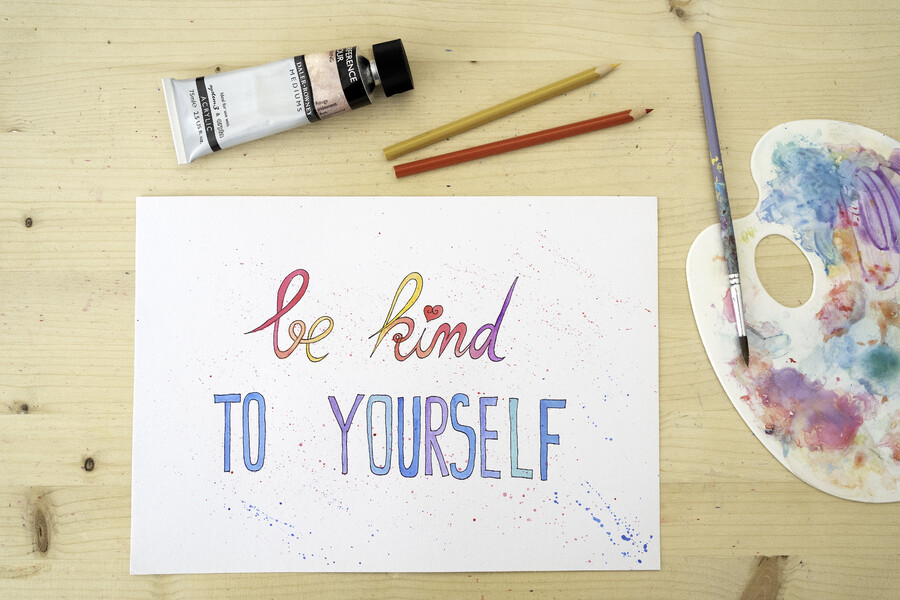Want to create a kinder culture at work? Start with this one critical component

Maybe you’ve read all the books on servant leadership or invested in coaching to become a more empathetic leader. That’s great, and kudos on your continued development. However, if you want to build a kinder culture, a critical but sometimes overlooked step involves starting with yourself and practicing self-compassion. After all, treating yourself with more compassion helps you become better at extending kindness to others.
In a Mayo Clinic article called The Art of Kindness, licensed professional counselor Steve Siegle highlighted the importance of being kind to yourself. “It is not just how you treat other people — it is how you extend those same behaviors and intentions to yourself as well. I believe you can be kinder in your own self-talk and practice gratitude,” he wrote. “People are good at verbally beating themselves up, and rarely does that work as a pep talk. Rather, negativity often causes you to unravel and may even create a vicious cycle of regularly getting down on yourself. You wouldn’t talk to your neighbor the way you sometimes talk to yourself.”
Self-compassion involves being honest yet kind with yourself when assessing a circumstance. That means acknowledging what you can and can’t control. Owning your mistakes while looking for the lessons to be learned. Letting go of being angry at yourself so you can figure out how to be better and truly support your goals and actions.
“Self-compassion entails treating oneself with kindness, recognizing one’s shared humanity, and being mindful when considering negative aspects of oneself,” said Dr. Kristin Neff, a major thought leader on the topic, in a study abstract titled Self-Compassion, Self-Esteem, and Well-Being. “Rather, it is a kind, connected, and clear-sighted way of relating to ourselves even in instances of failure, perceived inadequacy, and imperfection.”
Neff notes that self-compassion benefits your mental health and emotional resilience, decreasing feelings of self-isolation. As reported by Harvard Heath Publishing, self-compassion lowers levels of anxiety and depression and improves your general well-being.
Caroline Stokes, a certified executive coach and the author of Elephants Before Unicorns: Emotionally Intelligent HR Strategies to Save Your Company, agrees that being kind to yourself is an important component in promoting kindness at work. For her, it is personal.
“As a mother and a businessperson, I’m ‘always on’ to serve and be kind to others and I often forget myself. It backfires a lot and I burnout,” she explained. “When I mentally wake up from that, I find it’s a bit of a rebirth and end up creating new boundaries. It typically encompasses others reminding me to be kind to myself. I often balk at that, as my usual OS is to be the midwife of others’ success, but when I am reminded to be kind to myself, I approach it like an exercise or nutrition or sleep regimen.”
Stokes starts by reflecting on what she has done for herself lately, going over a mental checklist that includes rest, not feeling guilty about relaxing and creating time to focus on herself rather than someone else’s emergency. “This reminds me to be kinder to myself which immediately makes me feel nurtured,” she said. “When someone is kind to us, we feel nurtured and cared for. Too often we run so fast we forget that we need that for ourselves too.”
Being kind to ourselves has a ripple effect in the workplace. It gives others we work with permission to do it for themselves as well as each other. The result is a better, kinder culture.
“If toxicity breeds burnout, kindness breeds betterment,” continued Stokes. “There are no magic fairy dust style behaviors here. It’s about the words, intent, body language, goal states and levels of compassion for self, others, company, customer, greater environment. It may sound like a big ask, but it’s what the world needs to experiment with more.”
Here are 5 steps to practice more self-compassion at work:
Step 1: Start by choosing a specific situation from your career. For example, let’s say that you’ve been working on a major new business pitch for months and at the last minute the prospective client went with another option. Since learning this news weeks ago, you’ve been racked with a sense of failure and have been constantly berating yourself for the loss.
Step 2: Take a deep breath and write down what happened in detail, on a screen or paper. Then let it sit for a couple of hours or days; the intent is to create distance between the situation and your harsh self-judgment.
Step 3: Now think about your best friend or mentor at work —you know, the person who always has your back no matter what. What would they say if you were sharing this circumstance with them? As a supportive force in your world, I’m assuming that person would listen intently and express confidence that you can rebound from this situation and take a different approach moving forward. Going back to your write-up about the circumstance, add that kind of response in talking to yourself.
Step 4: With thoughtfulness instead of withering criticism, be understanding in acknowledging your fears. Reinforce your positive qualities, what you learned from the situation and express the value you continue to contribute to work, just as your friend would.
Step 5: Continue the self-kindness. Check in on yourself on a regular basis to ensure you practice compassionate self-acknowledgement and reality checks about your work performance. Point out what you’ve done right while committing to changing what isn’t working. Recognize that no one is perfect and that you’re only harming yourself by trying to live by an impossible standard. It’s all about striking a balance in the way you regard yourself, and ensuring that no matter what happens, self-compassion is present.
How has practicing self-compassion impacted your life? What kind of difference has it made in your workplace?
Looking for a step-by-step process to help you get unstuck and stay that way for good? Check out Free and Clear: Get Unstuck and Live the Life You Want. It is chock-full of helpful tips, easy-to-use tools and inspirational stories of individuals who overcame obstacles against the odds.
